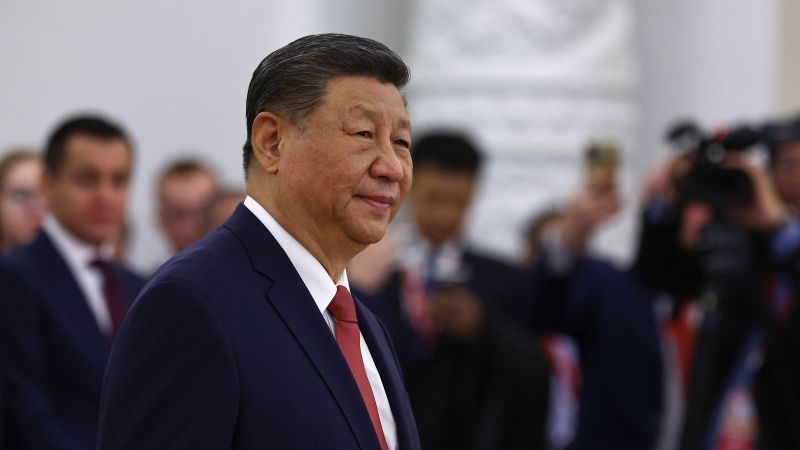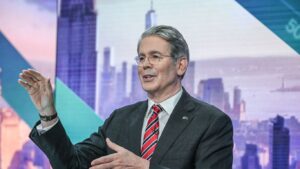
A summit of leaders from the BRICS group of major emerging economies commences in Brazil on Sunday, notably missing the presence of its most influential member’s leader. For the first time in over a decade, Chinese leader Xi Jinping will not attend the annual BRICS summit, a key platform in his strategy to reshape global power dynamics. This absence occurs at a crucial juncture for BRICS, which originally included Brazil, Russia, India, China, and South Africa, and has expanded to incorporate Egypt, the United Arab Emirates, Ethiopia, Indonesia, and Iran since 2024.
Xi’s decision to forgo the two-day summit in Rio de Janeiro comes as some BRICS members face a July 9 deadline to negotiate U.S. tariffs proposed by President Donald Trump. This, coupled with global economic instability stemming from Trump’s trade policies, places additional pressure on the group to demonstrate unity. Xi’s absence denies China a vital opportunity to present itself as a stable alternative leader to the U.S., a narrative Beijing has promoted to the Global South, especially in light of Trump’s “America First” policy and recent U.S. military actions against Iran.
Strategic Absence or Prioritization?
Despite Xi’s absence, observers assert that this does not signify a diminished importance of BRICS in Beijing’s foreign policy. Instead, it reflects a strategic prioritization amid domestic economic challenges and low expectations for significant breakthroughs at this year’s summit. Chong Ja Ian, an associate professor at the National University of Singapore, notes,
“BRICS is part and parcel of Beijing’s effort to ensure it isn’t hemmed in by U.S. allies.”
However, with Trump’s administration altering relations even with key partners, BRICS may not be Xi’s foremost priority as he focuses on China’s domestic economy.
China’s economic landscape is currently fraught with challenges, including trade tensions with the U.S., prompting its leaders to chart a course for the next five years ahead of a significant political conclave anticipated this year. In Xi’s stead, Li Qiang, his trusted deputy, will likely focus on strengthening energy ties with BRICS’ major oil-exporting members and advocating for the expanded use of China’s offshore and digital currency within the group.
Global Dynamics and Leadership Shifts
Xi is not the only notable absentee from the summit. Russian President Vladimir Putin will also participate via video link, avoiding potential arrest due to an International Criminal Court charge related to alleged war crimes in Ukraine. This absence provides Indian Prime Minister Narendra Modi an opportunity to take center stage during the summit and his subsequent state visit to Brazil. South African President Cyril Ramaphosa is also expected to attend, alongside other new BRICS members like Indonesia’s Prabowo Subianto.
Brazil’s President Luiz Inácio Lula da Silva may find Xi’s absence less impactful due to recent diplomatic engagements, including Xi’s visit to Brazil for the G20 summit and Lula’s visit to China. These interactions, coupled with low expectations for this year’s summit, likely influenced Xi’s decision to delegate his attendance.
The Future of BRICS and Global Economic Trends
BRICS, established in 2009 as a counterbalance to the G7, has gained significance amid global calls for a multipolar world. However, its diverse composition and recent expansion have raised concerns about its effectiveness. The group’s efforts to present a unified voice often encounter internal disagreements, as evidenced by a recent statement expressing concern over military strikes against Iran without directly naming the U.S. or Israel.
One area of potential consensus among BRICS members is the move towards de-dollarization, appealing to countries like Russia and Iran that face U.S. sanctions. Brazil’s agenda for its host term includes enhancing payment options to reduce vulnerabilities and costs. However, the notion of a “BRICS currency,” suggested by Lula in 2023, remains contentious and unlikely to be a focal point of discussions, particularly given Trump’s threats of imposing tariffs on BRICS countries supporting such a currency.
As the summit unfolds in Rio, the global community will closely watch how BRICS leaders address the use of national currencies, especially in a forum where China plays a leading role, but U.S. economic influence remains significant.







